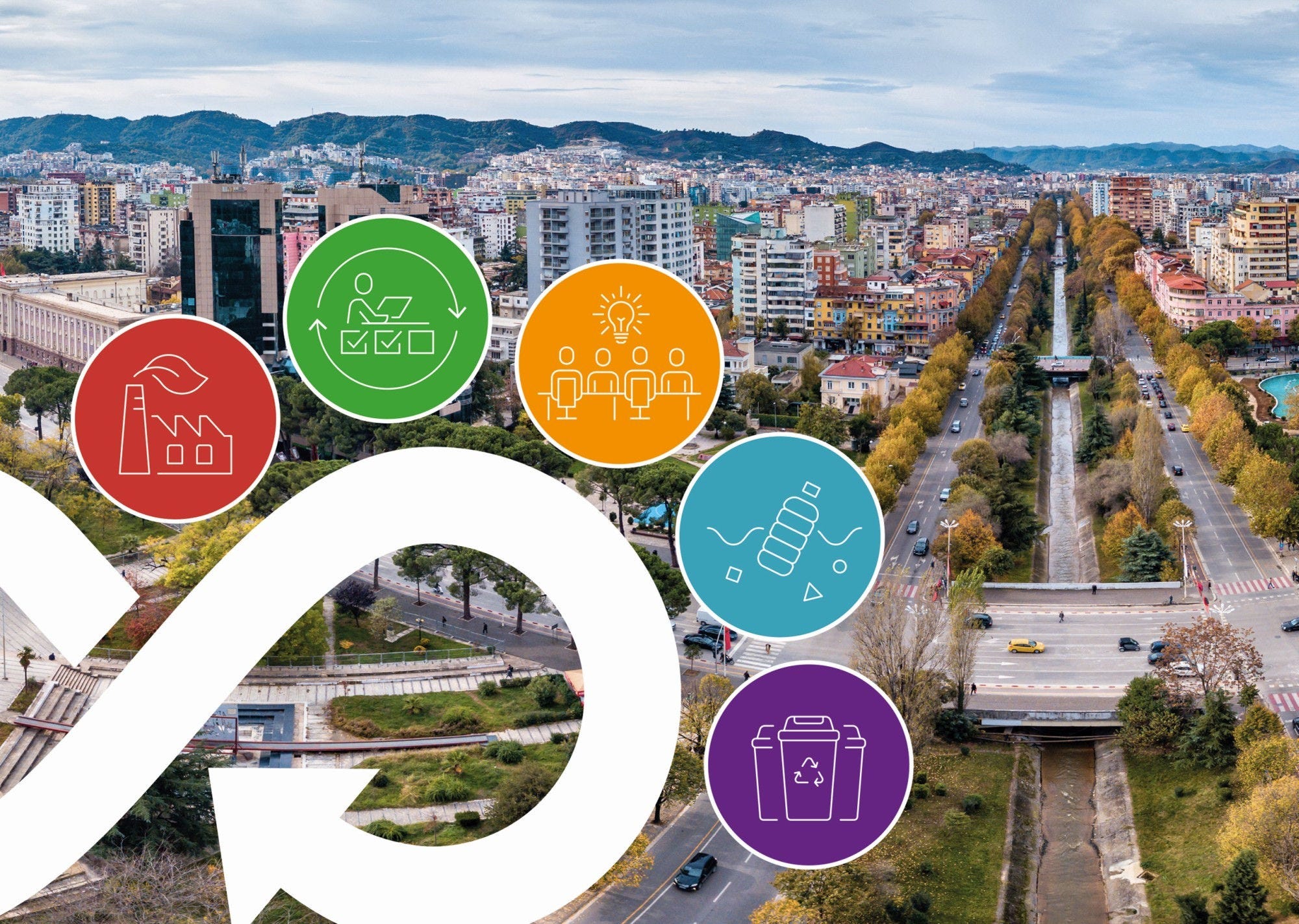This roadmap offers guidance to the Albanian government in laying a strong policy foundation for a successful circular transition. Informed by a comprehensive diagnostic of Albania’s circular economy landscape, the roadmap outlines a set of key policy recommendations and promotes strong alignment across sectors, policy measures, and stakeholders involved in this transformative process.
A Roadmap towards Circular Economy of Albania

Executive summary
There is a compelling case for a circular economy transition in Albania
Albania is increasingly embracing a circular economy, driven by its ambition to achieve sustainable economic growth, tackle persistent environmental challenges, and pursue regional and European Union (EU) integration.
Economic growth and heightened consumption are expected to increase the demand for raw materials in Albania, jeopardising its ability to relieve environmental pressures and hindering opportunities to enhance the competitiveness and resilience of its economy. Despite a doubling of resource productivity from 2016 to 2021, the economy still uses a relatively high volume of physical resources per unit of its gross domestic product. These trends amplify challenges in critical areas such as waste management, a significant threat to Albania’s ecosystems, potentially compounding existing climate change vulnerabilities. Although waste generation is approximately 30% below the EU average, the trajectory of growing consumption implies a trend that could aggravate issues related to unmanaged and illegal landfills, widespread littering, and suboptimal waste management practices. These factors contribute to a low recycling rate of municipal waste (estimated at 17%), along with substantial marine pollution resulting from high rates of plastic leakage.
Albania’s pursuit of EU membership and commitment to the Green Agenda for the Western Balkans serve as driving forces behind its endeavours in the circular economy. As the country progresses toward EU membership, it is strategically aligning its environmental policies and practices with established EU standards and regulations. Efforts to increase energy and resource efficiency, reduce waste, promote recycling, and implement eco-friendly initiatives are gaining traction, reflecting a collective commitment to mitigate environmental damage. Nevertheless, there is a need for these efforts to be intensified.
Albania needs a cohesive approach to guide it towards a circular economy, building the necessary infrastructure, raising awareness of the concept and providing financial impetus for an impactful transformation.
Proposed priority areas and key policy recommendations
The OECD analysis, based on a multi-criteria assessment and stakeholder consultations, identified three key areas where circular economy reforms could yield significant impact for Albania: 1) leveraging economic instruments for sustainable consumption and production; 2) supporting circular business models for small and medium-sized enterprises (SMEs); and 3) addressing the plastics value chain with a specific focus on marine litter. This roadmap puts forward 35 policy recommendations, accompanied by a monitoring framework, intended to track their implementation across all priority areas. Identified policy measures across these areas can help enhance municipal waste management, contribute to developing a more sustainable tourism sector and foster greater understanding and awareness of the circular economy. Adopting and implementing these recommendations can also help Albania achieve its climate change mitigation objectives, as a significant share of greenhouse gas emissions is associated with materials production and consumption.
Stimulating sustainable consumption and production through the use of economic instruments
Economic instruments can help attain circular economy goals at a reduced economic cost, while simultaneously encouraging innovation. They incentivise change across the life cycle, targeting product design and production upstream, stimulating circular consumption patterns, and encouraging re-use and recycling downstream.
Key policy recommendations to strengthen the use of economic instruments include:
Increase recycling and material recovery by implementing planned extended producer responsibility take-back schemes to increase the collection and recycling rates of specific waste streams (e.g. packaging, waste electrical and electronic equipment, batteries, and accumulators).
Strengthen the incentives provided by fiscal instruments for the circular economy and implement new measures to address different stages in the product life cycle (e.g. landfill tax, materials taxes, household waste charge reforms).
Gradually increase the use of green public procurement criteria as award criteria for a more circular supply of products and services.
Enabling the shift from traditional linear business models to circular business models for small and medium-sized enterprises
Circular business models can play a pivotal role in mitigating the environmental effects of material consumption. Given that SMEs constitute 99.8% of the firm population, helping SMEs design, adopt and scale up circular business models can contribute substantially to resource efficiency and environmental sustainability.
Key policy recommendations to support the adoption and scale circular business models include:
Provide financial support for scaling up circular business models by introducing calls for SMEs within funding programmes and offer corresponding non-financial support.
Establish and strengthen multi-stakeholder co-operation within and across value chains by establishing outlets for collaboration (e.g. circular economy business platforms, investor-entrepreneur matchmaking events).
Raise SMEs’ awareness and education on the circular economy through different engagement channels (e.g. communication campaigns, training programmes, administrative support).
Closing the plastics life cycle to keep materials in the loop and out of marine ecosystems
Plastic is a key material input in various sectors and is frequently disposed of in landfills at end-of-life or mismanaged. Low overall recycling rates and inadequate waste treatment significantly contribute to the leakage of plastic waste into the Mediterranean Sea. To shift away from primary plastics and boost recycling, Albania can leverage a set of targeted policy instruments, concentrating on critical applications.
Recommendations for a more circular plastics life cycle include:
Close the plastics loop through increased recycling and better waste management by investing into infrastructure and other measures targeting plastic packaging waste (e.g. extended producer responsibility take-back schemes, deposit-refund systems).
Shift demand from single-use plastics to alternatives and more reuse through a ban on single-use plastic products and targeted green public procurement.
Curb virgin plastics use through design and production-related measures (e.g. eco-modulated fees, minimum recycled content requirements, taxes on plastics).
Implement cross-cutting measures to raise awareness and educate authorities, businesses and households on preventing plastic waste and developing efforts to curb marine plastic litter.